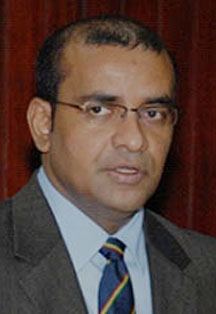GT&T’s negotiations with government preceding the recently tabled telecoms bill, aimed at liberalizing the sector, were both unsatisfactory and incomplete, according to the company’s Chief Executive Officer Yog Mahadeo.
The circumstance, Mahadeo told Stabroek Business, had left the company in a position where it was “‘reviewing its options,” though he declined to disclose what those options were.
Mahadeo pointed to an invitation, which he had received from Prime Minister Samuel Hinds, that had been extended “as a matter of courtesy” to formally inform the company that the Telecommunications Bill was being taken to the National Assembly on the same day. He said that at the time, he had given notice of GT&T’s dissatisfaction with the manner in which the negotiations leading to the tabling of the bill had been handled.

Mahadeo told this newspaper that while GT&T had made it clear all along that it was ready to play its part in a liberalized telecommunications environment, the company had been anticipating fair and amicable negotiations towards the eventuality of an end to its monopoly.
However, he noted that two significant proposals put to the government by GT&T in 2007 and 2010 for the development of the local telecommunications sector were given short shrift by the administration.
Mahadeo said that in November 2007, GT&T had presented a plan to the government that would have allowed for the Guyana-Suriname submarine cable, launched last year, to go through Brazil within two years of its commissioning here. The plan, which, according to Mahadeo, was never acknowledged by government, was presented prior to the administration’s announcement that it was undertaking a separate project to develop a cable link with Brazil.

And according to Mahadeo the government also gave the cold shoulder to a 2010 plan submitted to it by the telecommunications service provider for the creation of a country-wide broadband wireless service. In December last year the government announced its own plan for a countrywide WIMAX service. Mahadeo said he was unaware of the reason why GT&T’s offers were ignored.
Clear indications of tension between the Government of Guyana, the holder of 20 per cent of the shares of GT&T, surfaced some time ago in the wake of President Bharrat Jagdeo’s publicly expressed impatience with the pace of the company’s telecommunications infrastructure growth and his persistent advocacy of a liberalized telecommunications sector. However, Mahadeo pointed out that by failing to respond to GT&T’s April 2010 request for frequency allocation to drive its broadband build-out, the government itself had to take responsibility for the pace at which that project is proceeding. “The fact that the e-magine build-out across the country is where it is at this time has to do with the company not being given the frequency allocation which it requested,” Mahadeo said.
Mahadeo also told Stabroek Business that during the process leading to the liberalization of the telecommunications sector, GT&T remained “optimistic” that the government would take a position that would allow for a “level playing field” in a liberalized sector. He pointed out that he had acknowledged the role which President Jagdeo had played in the process and had publicly dedicated the company’s submarine cable to the President’s IT vision. Mahadeo said that while liberalization appeared to have been driven by an official notion that GT&T’s expansion programme was not moving quickly enough, he felt that that was an unfair position to take since some of the constraints that it faced lay inside the government’s control rather than its own. He added that while the company had pledged to “lead the way into liberalization,” the process had ultimately ended with proposed the legislation without thorough negotiations.
And according to Mahadeo, no amount of argument to the contrary can “wish away” the outstanding contribution that GT&T has made to the creation of a modern telecommunications sector in Guyana. “Over a twenty- year period ATN invested around G$3.5 billion dollars every year,” he said.
Company figures seen by this newspaper indicate that between 1999 and last year, the Government of Guyana received G$53,840,263,336 or sixty per cent of the revenue generated by GT&T while ATN, the majority shareholder received $35,838,199,038 or 40 per cent. The government’s takings include income, corporation and consumption taxes as well as dividends on its shares in the company amounting more than G$6 billion over the period.
Meanwhile, asked whether the loss of the monopoly would mean that GT&T would have to cut its budget for social spending, including spending on local educational, sport, cultural and humanitarian activities, Mahadeo said that he expected that the company would now have to pursue a more measured approach to such pursuits. “For us, there can be no question of operating in a corporate community without a social conscience. It is simply a question of circumstances dictating how much we do,” he added.
Under a liberalized telecommunications regime, Digicel becomes GT&T’s biggest competitor and it has already said that its first post-liberalization priority will be to compete in the international communications sector. Mahadeo told Stabroek Business that GT&T’s earnings from international calls had allowed it to subsidize local land calls to the extent where such calls cost less than one US cent per minute. “I expect that one of the consequences of the loss of that subsidy would be that there will be an increase in the rates for local calls,” he noted.




